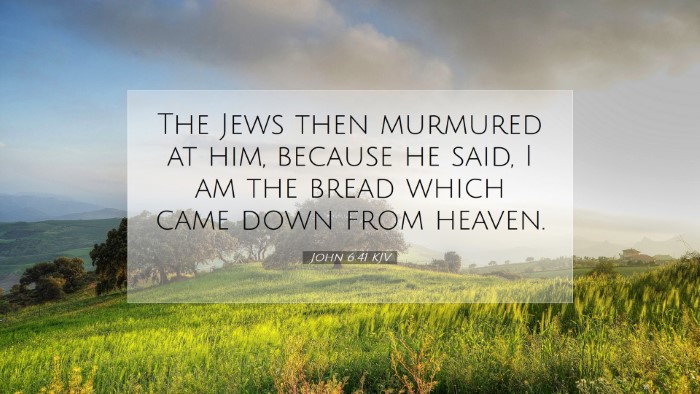John 6:41 Commentary
Verse: "The Jews then murmured at him, because he said, I am the bread which came down from heaven."
Introduction
In this pivotal moment in the Gospel of John, we see the Jewish leaders grappling with the implications of Jesus’ declaration of Himself as the "bread which came down from heaven." This verse is set within the wider context of Jesus’ teachings, focusing on His divine nature and His mission to offer spiritual sustenance to humanity. The murmuring of the Jews reflects a critical response to His claims, revealing their disbelief and misunderstanding.
The Context of the Verse
The narrative surrounding John 6 involves the feeding of the 5,000 and Jesus walking on water, acts that serve to establish His authority and divinity. Jesus' revelation of Himself as the bread of life occurs after these miraculous events, and it challenges the people's expectations of the Messiah as a political liberator rather than a spiritual redeemer.
Albert Barnes notes that the "bread from heaven" symbolizes the life-giving sustenance that Christ provides. The Jews’ murmuring highlights their inability to see beyond their physical needs and desires.
Additionally, Matthew Henry observes that this murmuring reflects human nature's tendency to doubt and grumble against divine provision, a theme consistent throughout Scripture, from the Israelites' reaction to manna in the wilderness to the current disbelief among the Jews.
The Response of the Jews
The Jews' reaction is one of incredulity. They question Jesus’ claim based on their knowledge of His earthly origin. Adam Clarke emphasizes that their murmurings are rooted in familiarity, stating, “Is this not Jesus, the son of Joseph, whose father and mother we know?” Their astonishment is tied to their inability to reconcile Jesus’ humble beginnings with His grand claims of heavenly origin.
The irony is palpable here; while they boast of their knowledge of Jesus’ earthly family, they dismiss the profound truth He presents regarding His heavenly mission. This reflects a broader spiritual blindness, as noted by Henry, who points out that familiarity with Christ can lead to contempt if one does not recognize His divine authority.
Theological Implications
This verse raises significant theological considerations regarding the nature of Jesus as the provision from God. The metaphor of bread is quintessential in biblical literature. Albert Barnes parallels this statement with God's provision of manna to the Israelites, suggesting that just as God provided for their physical needs, Christ meets the deeper spiritual hunger of humanity.
Furthermore, the murmuring of the Jews underscores a critical aspect of faith: the need to look beyond the physical and the familiar to embrace the spiritual truths presented by Christ. Matthew Henry brings forth the idea of spiritual nourishment, arguing that Jesus is the sustenance necessary for eternal life, contrasting the temporary satisfaction of earthly bread.
Lessons for Today
For pastors, students, theologians, and Bible scholars, John 6:41 serves as a reminder of the duality present in the response to Christ: belief and skepticism. In modern contexts, believers are often faced with disparities between societal expectations of Jesus and the radical claims He makes about His nature and mission.
- Understanding Spiritual Sustenance: Just as the Jews sought physical bread, modern individuals frequently pursue material possessions, neglecting the spiritual nourishment found in Christ.
- Pride of Knowledge: The Jews’ claim of knowing Jesus serves as a caution against the prideful assumption that familiarity equates to understanding. True comprehension of Christ's identity requires revelation from the Holy Spirit.
- The Importance of Faith: This passage showcases the essential role of faith in receiving Christ’s teachings. Without faith, one remains stuck in the realm of skepticism and doubt.
Conclusion
John 6:41 poignantly captures the struggle of faith in the face of human reasoning and the challenge posed by Christ’s identity as the true bread of life. As preachers and theologians, it is essential to encourage both the community of believers and seekers to respond to the invitation of Christ to partake in His life-giving grace.
May our understanding of Jesus as the divine sustenance deepen, prompting a response of faith rather than murmuring, allowing us to fully embrace the fullness of life He offers to all who believe.


